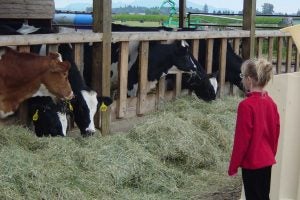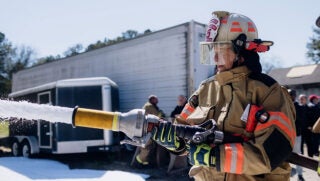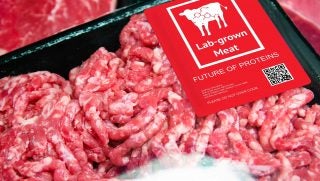Have you ever wondered if inviting people to your farm has value? Have you ever wondered if it is worth your time, resources and energy to coordinate a farm tour?
I am passionate about connecting consumers with the farmers who raise their food because I am a visual learner. Give me a book with all the information in the world, and I won’t retain a thing. Send me out to do something hands on, and I will amaze myself with how much information I remember and feel more closely connected to the folks involved with the learning activity.
I will be the first to admit that even though I am passionate about connecting farmers and consumers, I have wondered if farm tours are effective. What do people learn on tours? Are they worth the time?
I was shown a tour’s effectiveness recently when I was invited to tag along on the Wisconsin Beef Council’s Farm to Fork Tour co-sponsored by Edge Dairy Farmer Cooperative and Wisconsin Potato and Vegetable Growers Association. The tour was part of a pre-conference offering during the 2018 Wisconsin Academy of Nutrition and Dietetics Conference. Nearly 30 dietitians from across Wisconsin elected to participate in this optional tour because they had a desire to meet the farmers who are raising our food. Some had been on farms previously, while others had never stepped foot on a farm.
I took my place on the charter bus next to one of the attendees and started asking her about her job. She told me the things she enjoys about being a dietitian and some of the challenges. I was surprised to hear her say she is frustrated by the many ‘gray’ areas in nutrition. Specifically, she noted frustration with the ever-growing list of foods that are supposedly bad for you, cause cancer, take years off lives and in general the confusion created by unnecessary food labels. She jokingly stated that at least oatmeal is ‘safe’, so she can continue to enjoy that.
We had a great conversation about how farmers are frustrated by some of the same things (such as GMO-free salt, gluten-free water, etc.)
After a few minutes she shared that she grew up on a small farm in Wisconsin. This opened up more conversations because her family had cows, pigs, and chickens, so we talked about her life on a small diversified hobby farm. Then we talked about my passion for raising pigs and how it drove me into my college studies and job directly following. After sharing that I worked on a large pig farm after college, she began to quiz me about modern pig farms as she knows of a new barn being built.
A few of the topics we covered were manure management, a farm’s environmental impact, impact on farmers and rural residents and general care/health of the animals. She mentioned that she was most impressed with the technology farmers are utilizing to reduce their environmental impact while also making use of manure as a source of nutrients for their crops.
Our group had three tour stops, Alsum Farms and Produce, Hilltop Dairy and Next Generation Genetics — all of which happen to be Wisconsin Farm Bureau members. We had a jam-packed day of learning about three of Wisconsin’s agricultural commodities: potatoes, dairy, and beef. I certainly learned a lot but am always most energized by the excitement the farmer tour guides have for their line of work.
On the bus ride home, I asked my seat partner what her biggest take away from the day was and she didn’t take long to reply. She said, “I never realized how much science went into farming.”

I give kudos to the tour guides for not shying away from any topic. They made it evident that nothing was off limits and that they would talk through any or all topics related to farming. They talked about hormones and shared that many of the foods we eat, even vegetables have naturally occurring hormones. Another topic of interest was antibiotics and how farmers are using them in a responsible manner. The openness of the conversation coupled with being on the farm and seeing the farmer demonstrate or talk through how the animals are identified and cared for, until their meat or milk can enter the food supply again, was incredibly transparent.
My biggest takeaway from the day was that we cannot be afraid to open farms for tour groups. There are folks out there who just want to see what we do every day and ask us some questions first-hand. No one in our tour group was confrontational, no one was rude or ungrateful. In fact, they were the exact opposite. After getting off the bus for a final time, I saw many attendees thank the staff responsible for putting the tour together and saw smiles all around, even after a long day.
Agriculture is a consumer-driven market and consumers are further removed from the farm than ever before. Be bold and make a connection with a group of dietitians, foodies, a local mom group or anyone else interested in learning more about food. You don’t need to host a large group, you just need to have a meaningful conversation with a few people who will share your story with their friends.



